Login / Quote Area
0 items in your quote basket

UK : 01622 753662
International : +44 1622 753662
Login / Quote Area
0 items in your quote basket

Call
+44 1622 753662

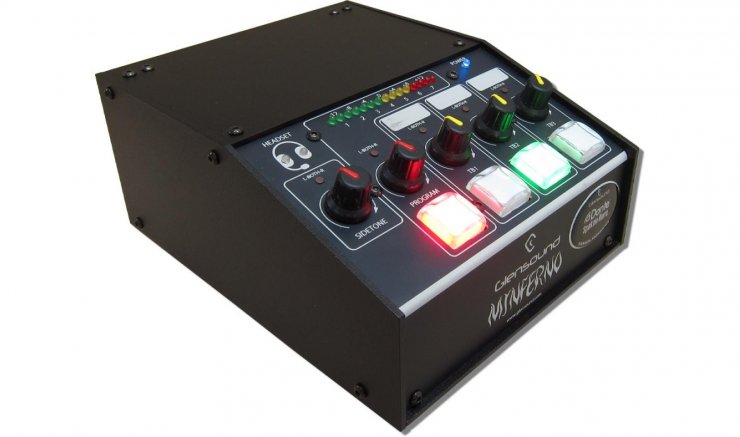
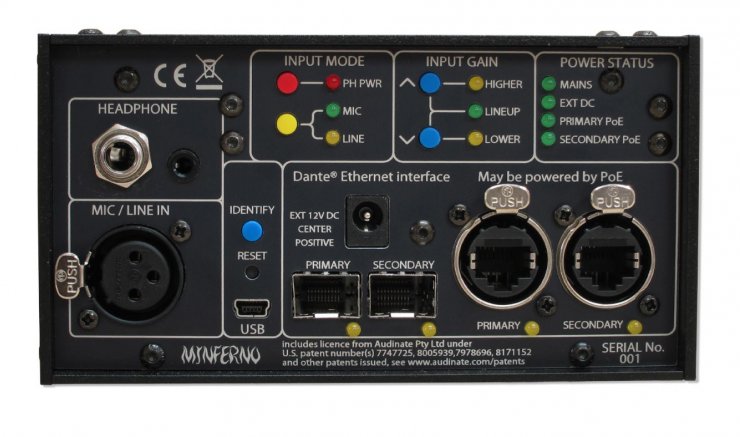
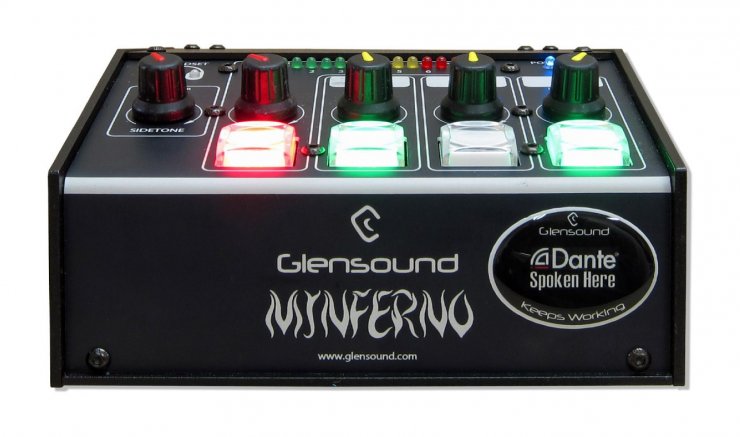
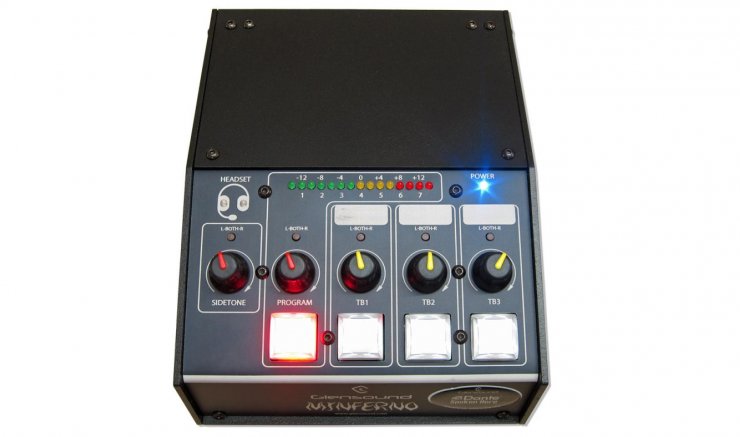
MinFerno Commentator’s Box
DANTE® Audio Network
MinFerno is a new, smaller, and even easier to use version of our exceptionally popular Inferno network audio commentary box.
MinFerno is designed for a single commentator/ announcer to use, and like its big brother the Inferno, it provides the very best possible commentary microphone amplifier and compressor limiter circuit for amazing on air sound.
The MinFerno is easy to use for commentators who would rather be talking about the game than figuring out how the equipment works. It is built to our exacting, rugged & robust standard to make it a reliable piece of broadcast equipment for the busy engineer.
Redundant Powering Options
The MinFerno can be powered from any of 3 different sources:
1) PoE on the Primary CAT5 Network link
2) PoE on the Secondary CAT5 Network link
3) External 12V DC
Four of rear panel LEDs show the availability of the 3 power sources.
Primary & Secondary SFP Slots
The SFP (Small Form-Factor Pluggable) fibre slots are standard networking ports that accept standard SFP modules. This means that you decide what type of fibre and connector style you want to use just by the SFP module that you insert. The primary & secondary network circuits allow for glitch free redundancy across both the Fibre & Copper network interfaces.
Primary & Secondary Copper Network Connections with PoE
Two CAT6 connections on Neutrik Ethercons (that accept standard networking cables) are provided to allow copper connections to local network switches to carry the Dante/ AES67 audio. Two connections are fitted to allow redundant circuits to be used if required.
Both of these connectors can accept a PoE power source for providing the power to the MinFerno.
Input Mode & Gain
One pair of push buttons selects the input type of the front panel XLR to be either microphone, line or microphone with 48V phantom power. 3 LEDs indicate which input mode is selected.
Two push buttons are used to alter the gain of the input. LEDs indicate if the gain setting is above or below our pre-configured ‘lineup’ levels. The front panel PPM of course provides an accurate indication of the input level.
The gain can also be altered remotely by a web browser pointing at the MinFerno's web page.
Up to 4 of Incoming Audio Volume Controls
On the top panel are up to 5 rotary headphone volume controls. 4 of these are connected to 4 incoming audio circuits from the Dante/ AES67 network. These are normally used for such sources as mixed programme or cue, talkback to director, talkback to producer, talkback to engineer etc.
Sidetone Volume Control
The 5th front panel rotary headphone volume control is ‘sidetone’. Sidetone is the commentator's own voice in their own ears.
Headphone Routing
Each of the 5 headphone volume controls has an associated left ear, right ear, both routing switch located next to the volume knob. This single push button switch routes the associated source to just the left, just the right or both channels of the stereo headphone amplifier.
To enable the commentator to know how they are routing a circuit the first time a routing switch is pressed, a pair of LEDs on the front panel indicate its current routing arrangement. The next time the routing switch is pressed then the next routing option is selected.
Robust Mic On and Talkback Buttons
There are up to 4 of large bright illuminated buttons (1 for programme and up to 3 for talkback). These switches route the outgoing microphone circuit onto up to 4 different Dante/ AES67 network audio circuits. The operation of these switches (momentary, latching etc) and the interaction of these switches (i.e. pressing a talkback switch mutes the main mic) can be fully configured via the web page.
15 segment LED PPM Meter
Audio input level is indicated on the 15 segment PPM meter.
Low Noise Microphone Amplifier With Remote Gain
We spent a long time optimising the performance of the THAT corporation microphone amplifier used in the original Inferno and used again on the MinFerno. It features very low noise & distortion circuit that we remote control the gain of in 1dB steps, which allows us to provide the remote webpage gain control as well as the rear panel gain push buttons. We also optimised the circuits to allow correct source impedance switching depending on whether the input has been set as a mic or line input.
Referee Compressor Limiter
As with all our commentary units, the MinFerno features our very popular Referee compressor limiter circuit. This circuit starts to compress the commentator’s voice gradually and slowly increases the compression ratio as the input level becomes overly high, resulting in a very natural sounding and distortion free audio output capable of taming even the loudest of commentators.
High Quality Analogue To Digital Converter (ADC)
Dante/ AES67 network audio is a digital circuit and as such the best analogue microphone amplifier would be wasted if we hadn’t paired it up with the best analogue to digital converter. The ADC's job is fairly simple, and if you look at our tech spec you’ll see that we’ve made ours work incredibly well.
Unique Headphone Amplifiers
The commentator’s headphones are a vitally important tool so we take as much care with our headphone amplifiers as with our on air microphones. Our unique headphone amplifier provides the correct output level regardless of the impedance of the attached headphones, meaning that broadcasters can now pick and choose between low impedance ‘cheap’ headphones and high impedance traditional broadcast ones.
Web Page Remote Control
The MinFerno has an internal web server that provides web pages for an operator to view when pointing a web browser at the MinFerno's address. The MinFerno uses a very useful network protocol called DNS (Domain Name System) allowing just ‘MinFerno and the unit's serial number’ to be entered in a browser’s address bar to connect. This is very useful if the IP address is not known.
Mic ON/OFF, Gain & Meter
One of the web pages allows access to the gain of the microphone meaning that the input gain can be adjusted completely remotely. The same page also provides the ability to turn the microphone on/off (and of course see its current state). A level meter is also provided on the same page so as any gain adjustments can be accurately monitored.
Channel Operation Configuration Page
Full control of how each of the 4 (3 talkback & 1 main mic) switches operate is provided. Each switch can be set to operate in the following modes: off, momentary on, latching, intelligent, momentary off (cough). The routing of the associated headphone input can also be forced or locked and the ability to fully attenuate the incoming source is also available.
Channel Effect Configuration
The MinFerno’s channel effect page allows the interaction between the talkback & mic switches to be set. Each channel can be set individually to either temporarily or permanently suppress (or not) any of the other channels that are already active when it is operated.
MINFERNO: Simplest version just programme go and return & sidetone
MINFERNO/1: MINFERNO plus 1 x talkback go and return
MINFERNO/2: MINFERNO plus 2 x talkback go and returns
MINFERNO/3: MINFERNO plus 3 x talkback go and returns
Also Available in AES67/Ravenna Version
AUDIO INPUT
Input Type: Neutrik 3 pin XLR
Input Impedance: Mic: 2k4
Line 100k
Equivalent Input Noise: 127dBu (22Hz-22KHz) RMS A weighted Terminated with 300 Ohms
Frequency response: Mic -2dBu @25Hz flat @50Hz till 22kHz (+/- 0.25dBu).
Line flat till 22kHz
Distortion at +8dBu: 100Hz = 0.023%
1kHz =0.012%
10kHz = 0.014%
Line Up Gains: Dynamic Mic: 58dB
Mic + Phantom Power: 35dB
Line: 0dB
Gain Range: Mic: -30 to +15dB
Line: +/-15dB
Max Input Before Clipping (@line up):
Dynamic Mic: +10dBU,
Mic+phantom: +18dBu
Line: +18dBu
HEADPHONES
Headphone Impedance: 16-1000 Ohms (auto output level to match impedance)
Headphone Noise: -76.6dB @ line up (residual noise)
Headphone Frequency Response: >-0.1dB 22Hz to 22kHz
Headphone THD + Noise (Ref +8dB): 0.008% @ 1kHz
Connection: 6.35mm & 3.5mm stereo jack plugs
Headphone Volume Pot Range: +10dB to Off (can be configured +10dB to -30dB)
Maximum Headphone Output: +16.8dB into 600 Ohms
POWER
PoE: Can be powered by PoE on either Copper network interface
PoE: Complies to IEEE 802.3af-2003 classification class 0
DC Input: 2.5mm Barrel, Centre +Ve, 9 - 15 Volts
Consumption: Front Panel Power On LED: Bright Blue
Rear Panel Power On Indicators: 1 green LED showing presence of each of the above power sources
PHYSICAL
Size: 144 x 179 x 76mm (WxDxH)
Weight: 1.01Kg (2lb3oz)
Mechanics: All aluminium construction, anodised and laser etched, powder coated sides
Shipping Carton: Rugged Export Quality cardboard carton 610 x 420 x 170mm (WxDxH)
Shipping Weight: 2.5kg
ENVIRONMENTAL
Operating Temperature: 0 to +50°C (32 to 122°F)
Storage Temperature: -20 to +70°C (-4 to 158°F)
Relative Humidity: 0 to 95% non-condensing
INCLUDED ITEMS
Handbook: Handbook can be downloaded
Mains Cable: UK & EU only, 2 metre mains plug to IEC
RJ45 Network Cable: 1 of 2 Metre
OPTIONAL ITEMS
Carrying Case: Polypropylene Carrying Case
SFP Fibre Modules: Multi Mode, Single Mode and Bi-directional on single Fibre available
External DC Power Supply: Switch mode (100 - 250VAC) desktop style with IEC mains input & 1.5 metre DC output cable
DANTE/AES67 VERSION
Physical: 2 x Neutrik Ethercons Cat6 RJ45s & 2 x SFP slots
Type: Fully redundant primary & secondary circuits
Sample Frequency: 48K
Resolution: 24 Bit
Control & Routing: Via Free Dante Controller
AES67: Can be configured for AES67
RAVENNA/AES67 VERSION
Physical: 2 x Neutrik Ethercons Cat6 RJ45s & 2 x SFP slots
Type: Fully redundant primary & secondary circuits
AES67: Yes
High Sample Rates: 44.1kHz - 192kHz
PTPv2: Master or Slave, IEEE-1588-2008 standard
SMPTE ST 2110-30: Yes. Including level C and CX
Please use one of the following methods to contact us:
Telephone: 01622 753662
International: +44 1622 753662
Email: sales@glensound.com
Skype: No longer used
Online: contact form
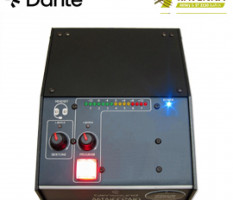
MinFerno/0
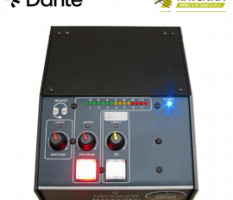
MinFerno/1
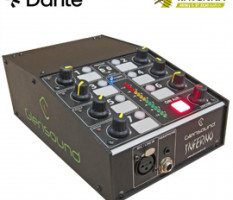
INFERNO
© Glensound
The Design Buildings, 6 Brooks Place, Maidstone, Kent, ME14 1HE, UK.
Tel UK : 01622 753662 | Tel international : +44 1622 753662 | Email : sales@glensound.com